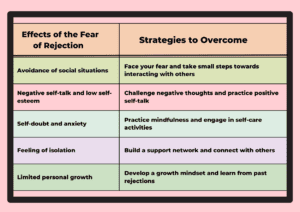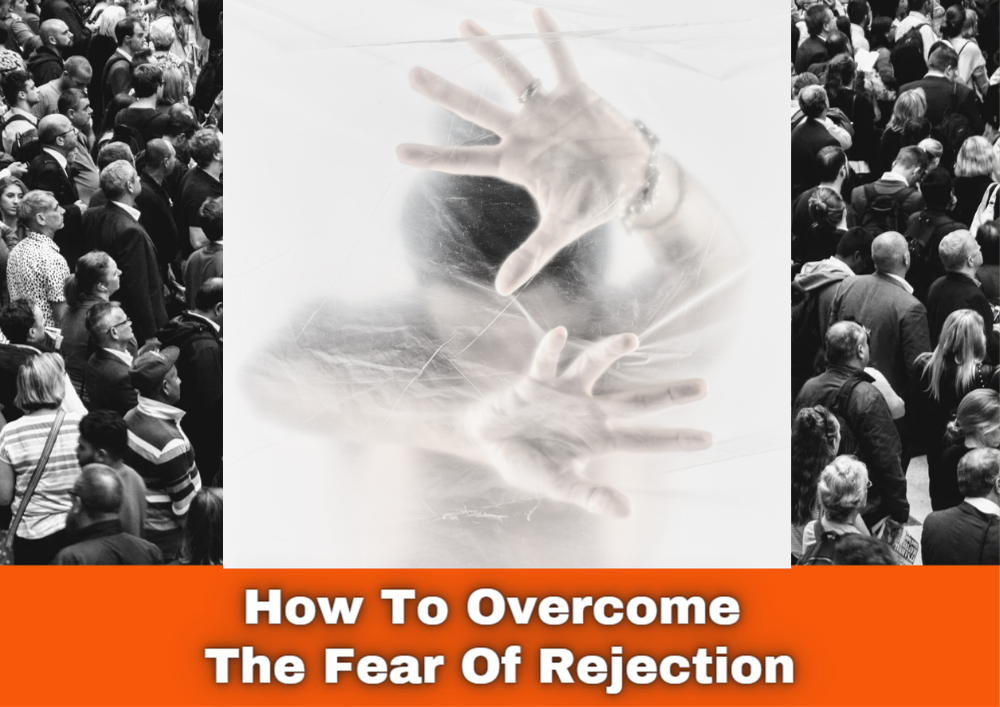What is Fear of Rejection?
Fear of rejection is a common emotional response to the possibility of being rejected, excluded, or disapproved of by others. It is a type of social anxiety that can manifest in personal and professional situations, causing individuals to feel insecure, anxious, and hesitant to take risks. It stems from various sources, including past experiences of rejection, low self-esteem, social anxiety, and a desire for validation from others. When this fear takes over, it can significantly impact a person’s life and lead to avoidance of social situations, self-doubt, negative self-talk, and feelings of isolation.
Fear of rejection can limit personal and professional growth, negatively affecting well-being and success. Several studies have shown the detrimental effects of the fear of rejection on individuals’ well-being and success. However, several strategies can be effective in overcoming the fear of rejection. Research has also highlighted the effectiveness of various strategies in overcoming the fear of rejection.

Best Solutions for Overcoming the Fear of Rejection
1. Identify and challenge your negative thoughts and beliefs:
Negative self-talk is one of the biggest culprits of the fear of rejection. When you constantly tell yourself that you’re not good enough or will be rejected, you reinforce these negative beliefs. By replacing negative thoughts with positive affirmations, you can break this cycle. For example, if you find yourself thinking, “I’m not good enough,” challenge this thought by asking yourself, “What evidence do I have to support this belief?” Often, you will find that there is no evidence to support these negative thoughts, and by challenging them, you can begin to change your mindset.
2. Face your fear and challenge it:
To overcome your fear of rejection, you must face your fear and challenge it. Avoiding situations that trigger the fear may provide temporary relief, but it only reinforces the fear in the long run. Start by taking small steps, like initiating a conversation with a stranger or sharing your opinions in a group setting. As you build up your confidence, you can gradually take on bigger challenges. Challenging the fear of rejection by questioning its validity can also be effective. Ask yourself questions such as “What is the worst that could happen?” or “Is this fear based on fact or perception?” By examining the fear, you can reduce its power and gain a more realistic perspective.
3. Embrace failure as a learning opportunity:
Failure is a natural part of life and can provide valuable lessons for growth and improvement. Instead of fearing failure, embrace it as a learning opportunity. Analyze what went wrong, what you can learn from the experience, and how you can do better next time. This shift in mindset can help you overcome the fear of rejection and become more resilient.
4. Practice self-compassion:
Practicing self-compassion can also be effective in overcoming the fear of rejection. This involves treating oneself with kindness and understanding rather than harsh criticism or self-blame. By cultivating self-compassion, you can develop a greater sense of self-worth and resilience when facing rejection.
5. Practice self-care:
Taking care of your physical and emotional well-being is essential for overcoming the fear of rejection. Make sure you’re getting enough sleep, eating well, and engaging in activities that bring you joy and relaxation. Exercise, meditation, and deep breathing can also help reduce anxiety and boost your self-confidence.
6. Build a support network:
Having a supportive network of friends, family, or a therapist can provide invaluable support as you overcome your fear of rejection. Share your feelings and fears with them, and ask for their feedback and encouragement. Having people who believe in you and your abilities can help you see yourself in a more positive light and give you the confidence to face your fears.
7. Take small steps:
Small steps can effectively build confidence and reduce the fear of rejection. This can include starting with low-risk situations, such as asking for a small favour or expressing an opinion in a low-stakes setting. By gradually increasing the level of risk, you can develop a greater tolerance for rejection and build resilience over time.
8. Build resilience:
Resilience refers to our ability to cope with adversity and bounce back from setbacks. Building resilience can help us develop a more positive outlook on life and make us more adaptable and flexible in the face of change. Some strategies for building resilience include practicing gratitude, cultivating social support networks, and engaging in activities that promote positive emotions and well-being.
9. Social skills training:
If you struggle with social skills or lack confidence in social situations, social skills training can be incredibly helpful. By learning effective communication strategies, building rapport with others, and coping with rejection in a healthy way, you can learn to navigate social situations with ease and confidence.
10. Practice mindfulness:
Mindfulness is the practice of being present in the moment and accepting your thoughts and feelings without judgment. When you’re feeling anxious or fearful, practicing mindfulness can help you ground yourself and become more aware of your thoughts and emotions. This can be particularly helpful when facing a situation that triggers your fear of rejection. By staying present and focused on the present moment, you can prevent your mind from racing ahead to negative scenarios.
Examples of Solutions to Overcome the Fear of Rejection
- Develop a growth mindset: People with a growth mindset believe that their abilities and intelligence can be developed over time. This mindset can help you view rejection as an opportunity for growth and learning rather than a personal failure. By embracing challenges and seeing them as opportunities to learn and improve, you can build resilience and reduce your fear of rejection.
- Learn from past rejections: Instead of dwelling on past rejections, use them as an opportunity to learn and grow. Reflect on what went wrong and how you can improve in the future. This can help you avoid making the same mistakes and build confidence in your abilities.
- Set realistic expectations: Setting unrealistic expectations for yourself can set you up for failure and reinforce your fear of rejection. Instead, set realistic goals and take small steps towards achieving them. Celebrate your successes along the way, and remember that failure is a natural part of the learning process.
- Practice positive self-talk: Instead of focusing on your perceived shortcomings, focus on your strengths and accomplishments. Practice positive self-talk by affirming your abilities and reminding yourself of your past successes. This can help boost your confidence and reduce your fear of rejection.
- Try exposure therapy: Exposure therapy is a type of therapy that involves gradually exposing yourself to the situations that trigger your fear of rejection. With the guidance of a therapist, you can learn to manage your anxiety and build confidence in these situations. Over time, exposure therapy can help you become desensitized to the fear of rejection and improve your ability to handle rejection.
Conclusion:
In conclusion, the fear of rejection can be a significant obstacle to achieving our goals and living a fulfilling life. However, with the right strategies and mindset, it is possible to overcome this fear and build resilience. By challenging negative self-talk, building a support network, and seeking professional help when needed, we can learn to handle rejection in a healthy way and view it as an opportunity for growth and learning.
Remember that rejection is a natural part of life and does not define our worth. With a positive mindset and a willingness to face our fears, we can overcome the fear of rejection and achieve our full potential.
